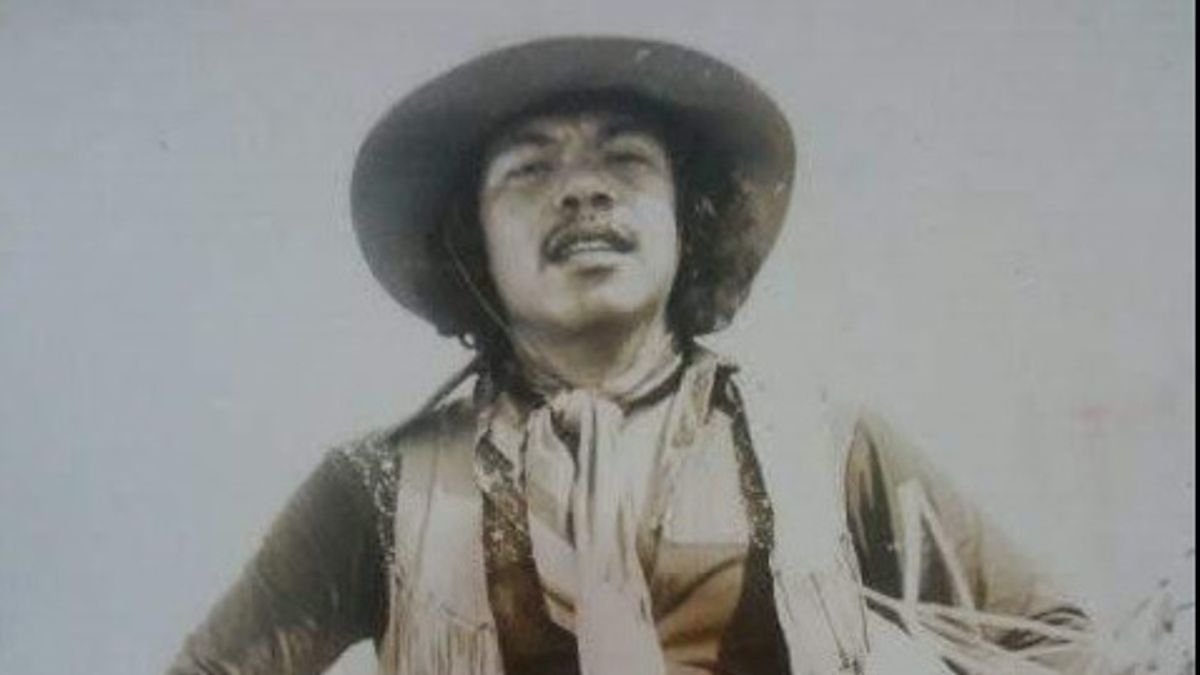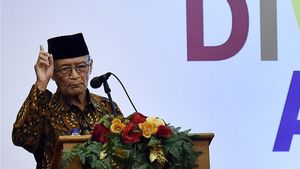JAKARTA - The legendary Betawi artist, Benjamin Sueb often looks stunning through his comedy acts. As a film player or singer. His "offensive" witty humor is popular overseas. However, not everyone is comfortable with his humor. The widows who are members of the widows corps were offended by his actions. The song Jande Tue (Nangke Lande) is considered demeaning to widows.
Benjamin clarified. He said the song was made to fulfill the screenplay of the film. Not addressed to all widows. No versatile Betawi artist is more famous than Benjamin Sueb. He is usually called Bang Ben.
Without hesitation, he always puts all kinds of Betawi dialects and expressions into his jokes. Song or movie. The simplicity of the material is its hallmark. Therefore, the character of the joke is second to none. Nothing is taboo in Benjamin's eyes. Everything was broken down.
Everything related to the daily problems of the Betawi people, who are starting to be marginalized, dominates Benjamin's comedy space. Problems such as love, floods, evictions, money, traffic jams, fraud and credit builders.
That simplicity made Benjamin dominate the screen in the 1970s. He did not just joke, but threw criticism. The proximity of the theme became the origin of his fame. His fans appear in all corners of the country, even the world.
So are his loyalists. On the other hand, Benjamin's popularity has also raised Betawi culture and language. Thanks to him, everything related to “Bebetawian” is widely known. To the extent that because of Benjamin's influence, there was concern that the Betawi language would replace Indonesian.
“In the mid-1970s, Benjamin was the most popular Betawi singer and comedian. Benjamin Sueb has starred in more than 40 films in less than 10 years. Betawian is Benjamin's main root in his work. Especially the Betawi dialect. The songs written by Benjamin are often paired with a touch of Betawi art, Gambang Kromong. The funny lyrics always use the Betawi language, which contains slices of the life of the poor Betawi people."

“The slice was also used by Benjamin in a series of films that he played. He often criticizes modernization in Jakarta. Most importantly, his critics often highlight the behavior of businessmen who only use Jakarta as a place to make money. Meanwhile, the lives of the Betawi people are affected. They are actually marginalized from their own homeland,” said David Hanan in the book Cultural Specificity in Indonesian Film: Diversity in Unity (2017).
Benjamin's main key in his work is none other than observation. As a Betawi child who lives in the middle of Jakarta, he is involved in many events. Especially, the change of the city of Jakarta from a big village to a metropolitan.
These changes are then photographed into stories that are closely related to the wider community. Thanks to that, Benjamin then followed in the footsteps of other seminarians who were able to become stars, such as Bing Slamet, Ateng, and Bagyo.
He always appears total in his work. Either as a main character or a supporter. At its peak, there are 11 film titles that use the name Benjamin. The use of this name is proof that Benjamin's works are enjoyed by a wide audience.
“There are 11 film titles with the 'Benjamin' frill.' Haji Ung's grandson was born March 5, 1939, (died September 5, 1995) did not form a permanent comedy group like Bing Slamet. That's why there aren't many films with the name Benjamin. In fact, Bang Ben played in about 53 film titles, both as the main character and supporting actor."
"Films that take the name Bang Ben are Benjamin Biang Kerok (1972), Amulet Benjamin, Biang Kerok Lucky, Benjamin Jerk (1973), Benjamin Si Abu Nawas, Benjamin Spy 025 (1974), Benjamin Tukang Sbobet, Benjamin Cowboy Serving, Benjamin Raja Lenong, Benjamin's Tractor (1975), Benjamin Falls in Love (1976)," explained Eddy Suhardy in the book Warkop: Playing So Not Playing (2010).
Benjamin 'digerudkan' widowBenjamin's expertise in bringing "offensive" comedies did not go smoothly. There are always people who are offended by Benjamin's comedy – the government to the commoners. This is because his jokes often perpetuate the 'naked' reality of life in the capital city, Jakarta.
The widows who are members of the Widows corps are among those who have been offended by Benjamin's humor. Benjamin's song, which later became an important element in the comedy film Ratu Envelope (1974), Janda Muda is considered to be degrading to women who are widows. The peak of his offence was because Benjamin sang the song on various programs, including the evening program on TVRI.
The direct objection was conveyed by a TVRI viewer from Jatinegara, Soeseno. He thought the witty song actually looked down on all widows. Soeseno then lodged his protest with a reader's letter regarding Benjamin S. Don't Humiliate Widows in Kompas Daily, January 22, 1975.
The criticism made Benjamin speak up. Exactly two weeks later, Benjamin wrote down his right to answer through Kompas Daily, February 3, 1975. Benjamin expressed his gratitude because the popular song known as Nangke Lande received great public attention. As part of self-control in career and life, he said.
Before continuing his writing explaining the problem of the song creation process, Benjamin first conveyed his apologies to all widows who were offended by the song.

He explained that the song was specifically created to match the scenario of his new film, which will soon be released, Ratu Envelope. In the film, Beny (Benyamin) uses the medium of song to make fun of an old widow, Connie (Connie Sutedja).
“The story goes like this: (sorry, I'm just using the language to talk... to make it more intimate). This song is one of the songs that I performed in the film 'Ratu Envelope' (unfortunately not yet released) directed by Nawi Ismail, the story of Br. Muntaco's word."
“The film stars myself as a village youth who is insulted because he doesn't have a permanent job (asshole). Connie Sutedja as a materialistic old widow likes to insult people, despising poor young people. There, I was nicknamed Teri Jengki youth (Betawi term) which means bitter food is often stuck in the throat,” said Benjamin as written by Wahyuni in the book Stove Mleduk Benyamin S. (2007).
According to him, there is no intention to vilify all widows. Moreover, Benjamin's mother, brother, sister and nephew are widows. The song was indeed created, as much as possible adapted to the scenario. Which, the contents describe the character of Connie's character. No more.
“That's how I created the song that was adapted to the scenario, so I don't just address all the widows. I truly repent if I go out to all widows, because I'm sure not all widows are like that, not all virgins are jerks, not all widowers are rude, and not all stepmothers (he says) are evil (remember the song Stepmother created by the late Mashabi)," concluded Benjamin.
*Read other information about CULTURE or read other interesting articles from Detha Arya Tifada.
Other MEMORIESThe English, Chinese, Japanese, Arabic, and French versions are automatically generated by the AI. So there may still be inaccuracies in translating, please always see Indonesian as our main language. (system supported by DigitalSiber.id)









